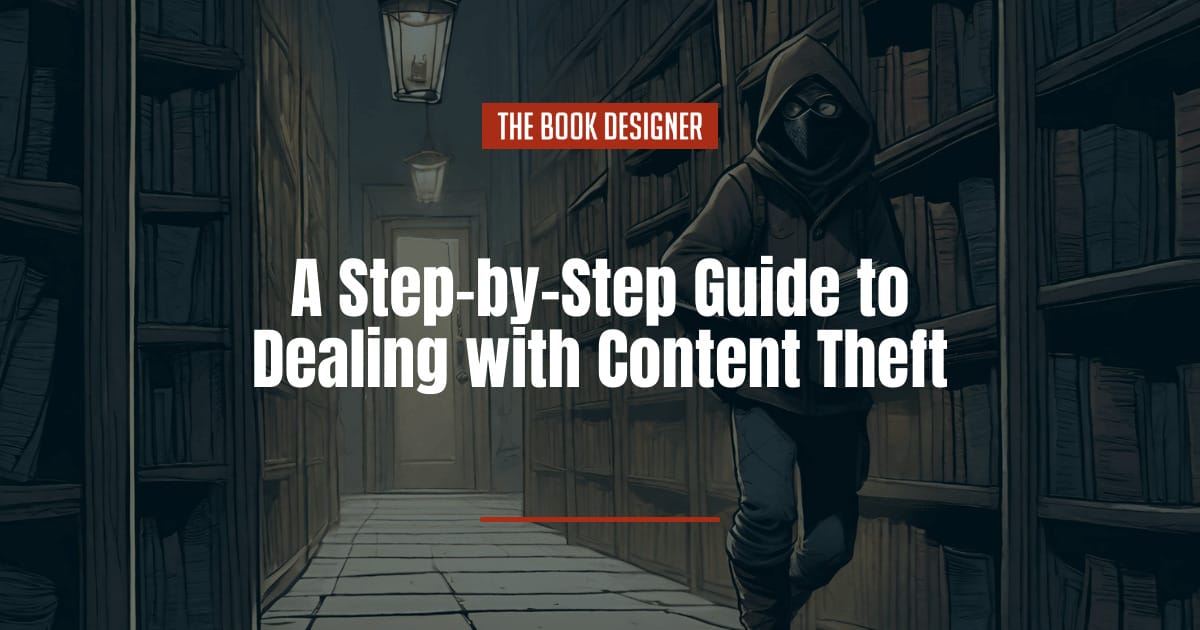Content theft is big business, whether it’s illegally downloading movies or reposting blog posts without attribution. Every month Google receives more than 30 million requests to remove search results that link to allegedly infringing material. Thirty million a month!
Sooner or later, every blogger and writer will find her work reposted or republished without permission. Or she may find websites offering free PDFs downloads of her books.
The good news is writers have various options for dealing with content theft, and 99% of the time, they will not need an attorney. A little research and a few emails may do the trick.
Here are the steps you need to take to deal with content theft:
Dealing with Online Content Theft
1. Contact the Site Directly
In most cases, if you email the infringing site and demand they remove your material, the site will comply. You may even get an apology. Believe it or not, some people still think everything on the internet is free to use.
2. Send a Takedown Notice
If an email request does not work, or you are dealing with a site that is offering free downloads, the next step is to send a “takedown notice” under the Digital Millennium Copyright Act (DMCA). All writers should learn how to send takedown notices. Like locking your car or home, it’s easy and sensible.
Social media sites like YouTube, Tumblr, Pinterest, and Facebook have online forms for reporting infringement and sending takedown notices. Typically, you’ll find them under links titled Legal, Copyright, Report a Problem, or Help. Here are the links for Facebook and Pinterest.
If you are dealing with an infringing website, then you send the takedown notice to the ISP hosting the infringing site. Go to https://www.whoishostingthis.com/ or https://whois.net/ and type in the domain. Many ISPs have online forms for sending takedown notices.
Plagiarism Today has downloadable forms for a cease-and-desist letter and a DMCA takedown notice. Its related company Copybyte offers a reasonably priced service that will send notices for you.
3. Notify Search Engines
Next, contact Google Copyright Infringement Reporting Tool and request that the infringing site be removed from their search results.
4. Contact Advertisers (Optional)
Jennifer Mattern, a top blogger on freelance issues, suggests you contact the site’s advertisers as well. I would not do so unless you are 100% certain the site is actually infringing your work (See Take A Deep Breath below).
Once the social media site, ISP, or Goggle receives a takedown notice, it contacts the alleged infringer. If the infringer does nothing, then the infringing material is taken down. End of story.
5. If That Does Not Work…
If the infringer disputes your claim, they may file a Counter Notification. If that happens, the online service will repost the infringing material unless you notify them within 14 business days that you have filed a legal action against the alleged infringer. Also, if the ISP is not based in the United States, it may simply ignore the takedown notice. In either of these cases, skip to
Dealing with Content Theft in Books and Ebooks
Stolen content in print and ebooks is particular upsetting. Amazon has an on-going problem with books and ebooks intended to trick buyers into purchasing the wrong product. According to Fortune Magazine, both Thirty-Five Shades of Grey and I am the Girl with the Dragon Tattoo sold thousands of copies before they were removed from Amazon’s site. Here are some options for ebook authors.
1. Set Up Google Alerts
I asked Mark Coker, founder of Smashwords, for his advice. He suggested that “writers set up Google Alerts for their book titles and for unique text strings that appear in the first 10% and last 10% of the book. For example, if a book has a sentence such as James picked up the salamander and gazed at its iridescent eyes… that sentence will probably never ever appear in any other author’s book, so create a Google Alert on it. Writers could create an additional Google Alert leaving the character name out of the string in case someone simply tries to change character names and republish the book as their own.”
2. Contact Amazon, Smashwords and Other Retailers
If you find an infringing book, then both Amazon and Smashwords will work with you to remove infringing materials or confusing knock-offs. Amazon’s copyright claims procedures can be found at Notice and Procedure for Making Claims of Copyright Infringement. For Smashwords, contact them through their website. I suspect every distributor has a similar process to assist authors.
3. Register Your Copyright
If you have not already done so, registered the copyright in the work being infringed immediately. You cannot file a lawsuit unless the work is registered with the US Copyright Office. If you threaten to sue, and the infringer searches copyright records and doesn’t find your registration, they may call your bluff. For more on how to register your copyright, see Joel’s post How to Copyright Your Book.
When to Hire an Attorney
If the infringement continues despite your efforts, then consider hiring an attorney. A cease-and-desist letter on lawyer letterhead may be taken more seriously. Attorney Kathryn Goldman wrote a helpful two-piece article on Molly Greene’s blog on what to do if your ebook is pirated.
However, I would not hire an attorney or jump into litigation without asking yourself whether it will be worth the effort. Sure, if you sue and win, you may be entitled to collect damages, but your damages (lost sales) may be small and difficult to prove. The infringer may be overseas and unreachable. And litigation consumes money like wildfire, not to mentioned time, attention, and sleep.
Take a Deep Breath
Before you accuse someone of infringement, keep in mind:
- Titles are not copyrightable. If someone uses a title similar to yours, you cannot claim infringement. Sorry.
- Ideas, themes, facts, and historical events are not protected by copyright. If someone publishes work covering topics similar to yours, that is not automatically infringement. Infringement implies close copying how you expressed ideas and information, not the ideas and information themselves.
- If someone is quoting your work for commentary, education, or review purposes, or creating a parody of your work, that is fair use and NOT infringement, no matter how scathing. Fair use is protected by the First Amendment, which trumps copyright law.
- Those sites offering cheap or free PDFs are typically scams downloading malware or stealing credit card numbers. Anyone who clicks through on those sites was unlikely to buy your book anyway.
- Don’t get caught up in a game of whack-a-mole. While it’s upsetting to see your work stolen, the theft may have little economic consequence to you. You could waste a lot of time chasing these low-lifes. As soon as you deal with one, others may pop up. Your energy may be better spent creating new work and finding new readers.
Have you experienced piracy? Have any other techniques worked for you?
Helen Sedwick, is a Contributing Writer for The Book Designer. She is also an author and a California attorney with thirty years of experience representing businesses and entrepreneurs. Her latest book is Self-Publisher’s Legal Handbook: The Step-by-Step Guide to the Legal Issues of Self-Publishing.
You can find more information about Helen here.
Disclaimer: Helen Sedwick is an attorney licensed to practice in California only. This information is general in nature and should not be used as a substitute for the advice of an attorney authorized to practice in your jurisdiction.
Photo: bigstockphoto.com




